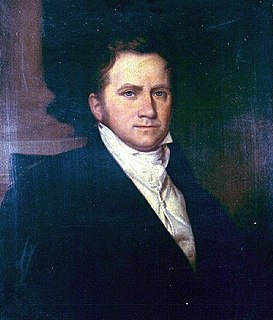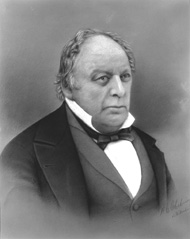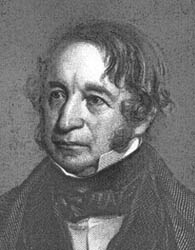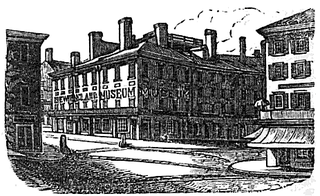
Charles Bulfinch was an early American architect, and has been regarded by many as the first native-born American to practice architecture as a profession.

Benjamin Williams Crowninshield served as the United States Secretary of the Navy between 1815 and 1818, during the administrations of Presidents James Madison and James Monroe.

Alexander Parris was a prominent American architect-engineer. Beginning as a housewright, he evolved into an architect whose work transitioned from Federal style architecture to the later Greek Revival. Parris taught Ammi B. Young, and was among the group of architects influential in founding what would become the American Institute of Architects. He is also responsible for the designs of many lighthouses along the coastal Northeastern United States.

Christopher Gore was a prominent Massachusetts lawyer, Federalist politician, and U.S. diplomat. Born into a family divided by the American Revolution, Gore sided with the victorious Patriots, established a successful law practice in Boston, and built a fortune by purchasing Revolutionary government debts at a discount and receiving full value for them from the government.

Nathan Appleton was an American merchant and politician and a member of "The Boston Associates".

Patrick Tracy Jackson was an American manufacturer, one of the founders of the Boston Manufacturing Company of Waltham, Massachusetts, and later a founder of the Merrimack Manufacturing Company, whose developments formed the nucleus of Lowell, Massachusetts.

Jeremiah Mason was a United States Senator from New Hampshire.

William Appleton was an American businessman and politician from Massachusetts. He was a trader, shipowner, and banker, and served as a U.S. representative from Massachusetts from 1851 to 1855, and again from 1861 to 1862.

Abijah Bigelow was a U.S. Representative from Massachusetts.

Benjamin Pickman Jr. was a U.S. Representative from Massachusetts.

The Concert Hall (1752–1869) was a performance and meeting space in Boston, Massachusetts, located at Hanover Street and Queen Street. Meetings, dinners, concerts, and other cultural events took place in the hall.

The Hollis Street Church in Boston, Massachusetts, was a Congregational and Unitarian church. It merged with the South Congregational Society of Boston in 1887.

The New-England Museum in Boston, Massachusetts, was established at 76 Court Street by Ethan A. Greenwood, Peter B. Bazin, John Dwight and Samuel Jackson. It featured displays of fine art, natural history specimens, wax figures, and other curiosities. Bands of musicians typically performed there during public hours.
Washington Gardens was a place of public entertainment and refreshment in early 19th-century Boston, Massachusetts. Also known as Vauxhall, it specialized in fireworks, circuses, musical and theatrical performances, pictorial exhibitions, and the occasional balloonist and necromancer. John H. Schaffer oversaw the enterprise beginning in 1814.

The Provident Institution for Savings (est.1816) in Boston, Massachusetts, was the first chartered savings bank in the United States. James Savage and others founded the bank on the belief that "savings banks would enable the less fortunate classes of society to better themselves in a manner which would avoid the dangers of moral corruption traditionally associated with outright charitable institutions."

Congress Street in Boston, Massachusetts, is located in the Financial District and South Boston. It was first named in 1800. It was extended in 1854 as far as Atlantic Avenue, and in 1874 across Fort Point Channel into South Boston. Today's Congress Street consists of several segments of streets, previously named Atkinson's Street, Dalton Street, Gray's Alley, Leverett's Lane, Quaker Lane, and Shrimpton's Lane.

Merchants Row in Boston, Massachusetts is a short street extending from State Street to Faneuil Hall Square in the Financial District. Since the 17th century it has been a place of commercial activity. It sits close to Long Wharf and Dock Square, hubs of shipping and trade through the 19th century. Portions of the street were formerly known as Swing-Bridge Lane, Fish Lane, and Roebuck Passage.

Andrew Dexter Jr., was an American lawyer, financier, and speculator. He is known for committing one of the first major financial frauds in the United States, and for being the founder of Montgomery, Alabama.
The 38th Massachusetts General Court, consisting of the Massachusetts Senate and the Massachusetts House of Representatives, met in 1817 and 1818 during the governorship of John Brooks. John Phillips served as president of the Senate and Timothy Bigelow served as speaker of the House. On February 10, 1818, the General Court issued the corporate charter for the Suffolk Bank to a group of the Boston Associates.


















